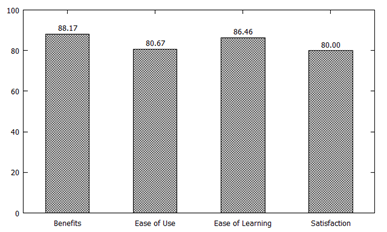Utilization of PhET simulation in flipped classroom to improve students' critical thinking skills
DOI:
https://doi.org/10.12928/jrkpf.v9i1.26Keywords:
PhET Simulation, Flipped Classroom, Concept Understanding, Critical Thinking SkillsAbstract
This research was conducted at Supra Talibura Junior High School, Sikka Regency, NTT, to determine the effect of increasing students' critical thinking skills after being given treatment using PhET Simulation in a flipped classroom setting. The trial sample used was 50 students divided into two classes. Each class was 25 people with purposive sampling. Data was collected by giving tests and questionnaires. Students are given apperception in videos a week before the learning takes place during the learning process. Giving videos aims to build students' initial learning knowledge to find out for themselves about learning topics: test t and N-gain analysis. Research results have been obtained; namely, there is an effect of using PhET from hypothesis testing and N-gain. At the same time, the results of the percentage of student response questionnaires indicate the level of student acceptance of the media used in learning.
References
Hikmah, N., Saridewi, N., & Agung, S. (2017). Penerapan laboratorium virtual untuk meningkatkan pemahaman konsep peserta didik. EduChemia (Jurnal Kimia dan Pendidikan), 2(2), 186-195.
Widodo, S. (2018). Peran Guru dalam Mengimplementasikan Kurikulum 2013 Edisi Revisi. Jurnal Pena Karakter (Jurnal Pendidikan Anak dan Karakter), 1(1), 46-54.
Kusnandi, K. (2019). Mengartikulasikan Perencanaan Pendidikan Di Era DigitaL. Jurnal Wahana Pendidikan, 6(1), 1-14.
Syafi'i, A., Marfiyanto, T., & Rodiyah, S. K. (2018). Studi Tentang Prestasi Belajar Peserta didik Dalam Berbagai Aspek Dan Faktor Yang Mempengaruhi. Jurnal Komunikasi Pendidikan, 2(2), 115-123.
Hazmi, N. (2019). Tugas Guru dalam Proses Pembelajaran. JOEAI: Journal of Education and Instruction, 2(1), 56-65.
Bistari, B. (2017). Konsep dan Indikator Pembelajaran Efektif. Jurnal Kajian Pembelajaran dan Keilmuan, 1(2), 13-20.
Supardi, S. U., Leonard, L., Suhendri, H., & Rismurdiyati, R. (2015). Pengaruh media pembelajaran dan minat belajar terhadap hasil belajar fisika. Formatif: Jurnal Ilmiah Pendidikan MIPA, 2(1).
Sharmila, S., & Putra, A. (2019). Integrasi Kegiatan Laboratorium dan Kontribusi Terhadap Hasil Belajar Fisika pada Konsep Fluida dalam Pembelajaran Fisika SMA. Pillar Of Physics Education, 12(2)
Rizaldi, D. R., Jufri, A. W., & Jamal, J. (2020). PhET: Simulation Interaktif Dalam Proses Pembelajaran Fisika. Jurnal Ilmiah Profesi Pendidikan, 5(1).
Ramadoan, N., Suisworo, D., & Jauhari, I. (2018). Strategi Berpikir Hipotetikal Deduktif Dengan Phet Simulations Terhadap Keterampilan Berpikir Kritis Pada Pembelajaran Fisika Materi Usaha dan Energi Kelas X SMA. In Prosiding SNFA (Seminar Nasional Fisika dan Aplikasinya). 3, pp. 206-215.
Fithriani, S. L., Halim, A., & Khaldun, I. (2016). Penggunaan media simulation phet dengan pendekatan inkuiri terbimbing untuk meningkatkan keterampilan berpikir kritis peserta didik pada pokok bahasan kalor di SMA Negeri 12 Banda Aceh. Jurnal Pendidikan Sains Indonesia (Indonesian Journal of Science Education), 4(2), 45-52.
Syakdiyah, H., Wibawa, B., & Muchtar, H. (2018, November). The effectiveness of flipped classroom in high school Chemistry Education. In IOP Conference Series: Materials Science and Engineering (Vol. 434, No. 1, p. 012098). IOP Publishing.
Subarkah, C. Z., Supiandi, U., & Sari, S. (2018, November). The development of buffer solution material through flipped classroom model. In IOP Conference Series: Materials Science and Engineering (Vol. 434, No. 1, p. 012089). IOP Publishing.
Putri, M. D., Rusdiana, D., & Rochintaniawati, D. (2019, February). Students’ conceptual understanding in modified flipped classroom approach: An experimental study in junior high school science learning. In Journal of Physics: Conference Series (Vol. 1157, No. 2, p. 022046). IOP Publishing.
Fakhri, M. I., Bektiarso, S., & Supeno, S. (2018). Penggunaan Media Pembelajaran Animasi Berbantuan Macromedia Flash Pada Pembelajaran Fisika Pokok Bahasan Momentum, Impuls, Dan Tumbukan Kelas X Sma. Jurnal Pembelajaran Fisika, 7(3), 271-277.
Astutik, S., & Prahani, B. K. (2018). The Practicality and Effectiveness of Collaborative Creativity Learning (CCL) Model by Using PhET Simulation to Increase Students' Scientific Creativity. International Journal of Instruction, 11(4), 409-424.
Puspitaningrum, H. Z., Astutik, S., & Supeno, S. (2018, May). Lembar kerja peserta didik berbasis collaborative creativity untuk melatihkan kemampuan berargumentasi ilmiah peserta didik SMA. In Quantum: Seminar Nasional Fisika, dan Pendidikan Fisika (pp. 159-164).
Amin, S. (2016). Virtual Laboratory Tour Dengan Teknologi Dekstop Virtual Reality (Doctoral dissertation, Universitas Negeri Semarang).
Mehram, M. (2017). Upaya Meningkatkan Kemampuan Guru Dalam Merancang Eksperimen Virtual Kimia Sederhana Dengan Microsoft Power Point Melalui Workshop Mgmp Kimia Sma Binaan. Jurnal Serambi Ilmu, 18(1), 1-10.
Awidi, I. T., & Paynter, M. (2019). The Impact of a Flipped Classroom Approach on Student Learning Experience. Computers & Education, 128, 269-283.
Cabı, E. (2018). The Impact of The Flipped Classroom Model on Students' Academic Achievement. International Review of Research in Open and Distributed Learning, 19(3).
Tang, T., Abuhmaid, A. M., Olaimat, M., Oudat, D. M., Aldhaeebi, M., & Bamanger, E. (2020). Efficiency of Flipped Classroom with Online-Based Teaching under COVID-19. Interactive Learning Environments, 1-12.

Downloads
Published
Issue
Section
License
Copyright (c) 2022 Adi Jufriansah, Lensiana Lering, Pujianti B. Donuata

This work is licensed under a Creative Commons Attribution-NonCommercial 4.0 International License.







